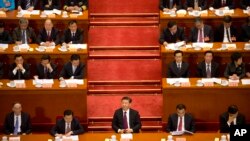Chinese leaders are expected to emerge from a party congress this month with signals on whether they will take a hard or soft stance toward the widely contested South China Sea, a region of concern from Southeast Asia to Washington.
China claims nearly the entire 3.5 million-square-kilometer, resource-rich sea between its south coast and the island of Borneo. Those claims overlap the maritime exclusive economic zones of four militarily weaker Southeast Asian claimants, many backed by the United States.
Future South China Sea policy
When China’s ruling Communist Party holds its 19th National Congress this week, senior leaders have power to instruct the party on how to handle the maritime dispute over the next five years. They might agree to follow international law, for example, though without giving up sovereignty. They could also suggest a tougher approach or decide to take the current line – expansion while giving aid to other claimants.
“The most likely scenario is a reiteration of the established maritime South China Sea policy,” said Fabrizio Bozzato, a Taiwan Strategy Research Association fellow. “There might be a change of tone in a more muscular sense. That’s a possibility but not a certainty.”
Closed meetings
The party that has single-handedly ruled China since the 1940s will meet largely behind closed doors during the Congress that opens in Beijing Oct. 18. Typically congresses touch on all major issues of concern to China and, where needed, come up with new ideas.
Change may be neither “drastic” nor “significant” after the congress, Bozzato said. China would still advocate peaceful support for easing disputes, he predicted.
China might use more of the language in the United Nations maritime law to explain its position, said Douglas Guilfoyle, associate international law professor at Monash University in Australia. China believes, for example, that larger islets under a country’s control should confer an exclusive economic zone in the surrounding sea.
Slight policy change possible
“There does seem to be some very tentative signals that China might be attempting to re-frame or at least frame its position more in terms of generally accepted norms,” Guilfoyle said. “At the end of the day, it’s very difficult to maintain territorial or quasi-territorial claims that no one else will actively support.”
A world arbitration court ruled in July 2016 against Beijing’s legal basis to claim much of the sea. China rejected the ruling, but since then it has tried to get along better with the rival Southeast Asian states. Those states are Brunei, Malaysia, the Philippines and Vietnam. Analysts expect no change in this element of Chinese diplomacy.
The other countries resent China for passing coast guard vessels through disputed waters and building artificial islands for reported military use.
China uses historic records to argue its claim to the sea, which is valued for commercial shipping lanes, fisheries and undersea fossil fuel reserves. The United States periodically irritates China by sending navy vessels into the sea to show it’s still open to all countries. Chinese and American media say one passed near the sea’s Paracel Islands in early October.
In other shows of worry about China’s maritime control, India is backing Vietnam’s exploration for oil and gas in contested tracts, and in June Japan passed a helicopter carrier through the sea.
The Communist Party congress can also just acknowledge developments on a foreign policy issue without taking a position. At the congress in 2012, former chairman Hu Jintao’s political report just noted “greater instability and turbulence in the international system” compared to five years earlier, a study by the Hoover Institution at Stanford University says. That comment referred to the 2008 financial crisis and its “global repercussions,” according to the study.
President Xi Jinping may become more powerful
China has already moderated its stance over the past year to ease tensions, evidenced by lack of new landfill for construction of artificial islands, said Oh Ei Sun, international studies instructor at Singapore Nanyang University. China would be able to hold this position if the congress appoints President Xi Jinping to another five years as party chair, he said.
The widely forecast reappointment would give Xi more authority and confidence to carry out policy, scholars believe.
“I think after the 19th Party Congress, you will see this sort of stance be prolonged for quite a significant period of time, because there’s no need to posture anymore,” Oh said.
But outcomes of the congress may embolden China to go ahead with island building or military movements, especially if the United States antagonizes it, Bozzato said. “It’s logical Xi Jinping will have to show some muscles,” he said.







